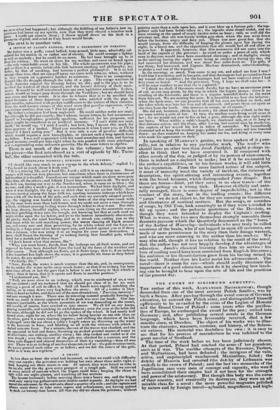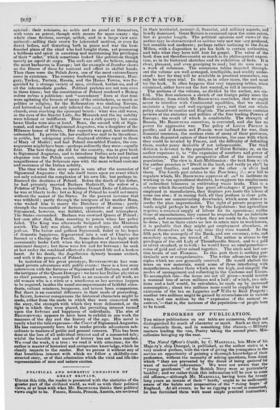THE COURT OF SIGISMUND AUGUSTUS.
THE author of this work, ALEXANDER BRONIKOWSKI, though' descended from one of the most ancient Polish families, was by birth a Saxon. After passing through the usual course-of German education, he entered the Polish army, and distinguished himself sufficiently to be rewarded by the cross of the Legion of Honour and the Grand Cross of Poland : some years after the pacifica- tion of Europe, he exchanged the sword for the pen ; retired into Germany; and, after publishing several novels in the German language, which have been favourably received, died a few months since, at-Dresden. The object of his works was to illus- trate the character, manners, customs, and history, of the Sclavo- nic nations. His material was doubtless his own : it is easy to see that for his process of manufacture he was indebted to the great novelist of Scotland. The time of the work before us has been judiciously chosen. At that period, Poland had reached the acme a her grandeur, such as it was. The warlike attempts of the Russians, Tartars, and Wallachians, had been defeated ; the intrigues of the vain, active, and unprincipled weathercock Maximilian, foiled ; the dutchv of Mazovia had reverted (the dut.thy of Lithuania was united) to the crown of Poland ; and the last two monarchs of the Jagellonian race were men of courage and capacity, who woul have consolidated their empire had it not been for the strength and powerof the aristocracy. But though this body was the curse of their country, and eventually its destroyers, they were an ad- mirable class for a novel : the more powerful magnates polished_ by nature and by foreign travel—splendid, magnificent, and high- spirited : their retainers, as noble and as proud as themselves, with votes as potent, though with means far more scanty : the whole class factious, corrupt, selfish, and in a large view anti- national—selling their crown for interested motives, or even for direct bribes, and thwarting both in peace and war the best- founded plans of the chief who had bought them, yet possessing a boldness and spirit in asserting and maintaining the privileges of their " order," which sometimes looked like patriotism though merely an esprit de corps. The serfs are still, we believe, among the most barbarous in Europe; but the example of Ivanhoe shows us the fitness of these for contrast and effect in skilful hands. Then there were the Polish Jews, one of the most extraordinary races in existence. The country bordering upon Germany, Hun- gary, Turkey, Tartary, Russia, and the Hanse Towns, was fre- quented by a strange variety of men, civilized, barbarous, and of all the intermediate grades. Political prelates are not rare even in these times; but the constitution of Poland rendered a Bishop nolens volens a politician: and "ascendancy" fears at that time were agitating the breasts of many of the overlookers, as much us polities or religion; for the Reformation was shaking Europe, and heterodoxy had not only infected the y, but penetrated the church, even reaching the episcopal bench : what was still worse, in the eyes of the Scarlet Lady, the Monarch and the lay nobility were tolerant or indifferent. Here was a rich quarry ; but some hewn blocks were also at hand. Bona, the second wife of Sigis- mund, and mother of Sigismund Augustus, was a daughter of the Milanese house of Sforza. Her capacity was good, her ambition unbounded. In private life, her conduct was said to be licentious; in public, her intriguing policy displayed abilities equal to those of Mary of Medici ; and had Poland resembled France, the con- sequences might have been—perhaps indirectly they were—equally fatal. The best thing she did for the country, was to give birth to Sigismund Augustus, and to introduce Italian arts and Italian elegance into the Polish court, combining the feudal pomp and magnificence of the Sclavonic race with the more refined customs and costumes of the Italian nobility.
The time when the story opens is soon after the accession of Sigismund Augustus : the tale itself turns upon an event which not only coloured the complexion of his own life, but perhaps in- fluenced the destinies of Poland. Before the death of his father, he had privately married Barbara Radziwill, the widow of a Palatine of Troki. This, as hereditary Grand Duke of Lithuania, he was at liberty to do; but as King of Poland he could not marry without the assent of the States. In the present instance that was withheld ; partly through the intrigues of his mother Bona, who wished him to marry the Dutchess of Mantua ; partly through the treasonable or factious opposition of many nobles. Sigismund, however, was faithful, obstinate, and triumphant. The States succumbed. Barbara was crowned Queen of Poland ; but soon after died, Bona resorting to poison when her policy failed. The King was afterwards badgered into the Mantuan match. The lady was plain, subject to epilepsy, and stormily jealous. The heroic and gallant Sigismund, foiled in his hopes of domestic happiness, degenerated into a sort of Charles the Second or a George the Fourth. Some flashes of his high spirit occasionally broke forth when the kingdom was threatened with imminent danger; but these were few and far between : he sank at last under the combined effects of a dissipated life and a broken heart. At his death, the Jugellonian dynasty became extinct, and with it the prospects of Poland.
In imitation of his great prototype, BRONISHOWSRI has corn- bitied private adventures with public events there is a love story interwoven with the fortunes of Sigismund and Barbara, and with the intrigues of the Queen Dowager : we have her Italian physician as chief poisoner, a renegade Turk as an assassin of all work, an old woman who is a witch or a murderess as her services happen to be required, besides the usual accompaniments of faithful atten- dants, valiant retainers, burgesses, and tavern boon companions. But there is an essential difference in their mode of proceeding. In Scorr, however conspicuous the historical characters might be made, either from the mode in which they were connected with the story, the strength with which they were delineated, or the light in which they were placed, the pervading interest turned upon the fortunes and happiness of individuals. The aim of BRONIKOWSKI appears to have been to exhibit in one work the manners of the day and the history of the age. His novel is nearly what the title expresses—the Court of Sigismund Augustus. He has consequently been led to render private adventures sub- ordinate to matters of public and general concern. This has been done at the loss of all individual interest and of a connected tale; whilst the breadth and march of history has not been reached. We read the work, it is true : we read it with attention; for the author is master of historical and antiquarian knowledge, which ho clearly imparts to the reader. But we peruse it without any of that breathless interest with which we follow a skilfully-con- structed story, or of that admiration which the vivid and life-like representation of men and nature excites.





















 Previous page
Previous page